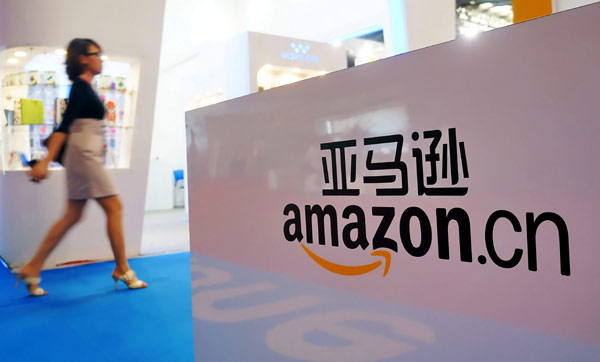Amazon shakes hands with its Chinese rivals
Updated: 2015-03-16 09:38
By Emma Gonzalez(China Daily)
|
||||||||
 |
|
An Amazon banner displays at an electronic exhibition on June 28, 2012 in Shanghai. [Jing Wei / Asianewsphoto] |
If you cannot beat them, join them. That's what US e-commerce company Amazon.com Inc must have thought when it decided to set up a virtual storefront in competitor Alibaba Group Holding's Tmall website.
It is no secret that Amazon has struggled to expand its business in the world's second-biggest economy, as Chinese consumers continue to make most of the online purchases through local e-marketplace channels like Tmall and Taobao.
"At this point in time, Amazon is not able to compete with Tmall and JD.com. Part of this is related to the fact that the United States headquarters is in charge of all decisions. But even if Amazon China had more autonomy, it will still find it difficult to compete with local players," said Will Tao, technology analyst at iResearch.
The opening of a storefront in Tmall clearly reflects Amazon's intention to extend its market share in the lucrative Chinese market, no matter what it takes.
"Opening an Amazon International Brand Flagship Store on Tmall is one of the efforts to provide additional channels and access to the highquality international products Amazon can bring to Chinese customers," said Brandy Niu, director of international brands at Amazon China.
The storefront, due to be officially launched in April, will offer a wide range of imported products, including footwear, food, drinks and toys, the company announced in a news release.
Amazon's Tmall store will offer more than 1,000 imported products, including some brands sold exclusively in China by Amazon such as Panama Jack and Logan.
One of the main differences between Amazon's business and those of its competitors is that Amazon buys and sells merchandise and operates its own delivery network.
Amazon notes that the company has invested in its own warehouses and logistics in the country to carry out the expansion in China.
"Unlike Amazon, Alibaba does not hold inventory and does not have to invest substantially on property, plants and equipment, which contributes to higher margins" said Ivan Feinseth, an analyst at research firm Tigress Financial.

 The CeBIT trade fair opens in Germany
The CeBIT trade fair opens in Germany
 Now and then: Lottery dream fading
Now and then: Lottery dream fading
 Braving the snow for greener pastures
Braving the snow for greener pastures
 Special: Preserve the past to live the future
Special: Preserve the past to live the future
 Push for Lunar New Year school holiday
Push for Lunar New Year school holiday
 Bruce Lee's legacy promotes Kungfu in LatAm
Bruce Lee's legacy promotes Kungfu in LatAm
 Germany's Black Forest: a popular holiday destination
Germany's Black Forest: a popular holiday destination
 Sea of color at Shenzhen race
Sea of color at Shenzhen race
Most Viewed
Editor's Picks

|

|

|

|

|

|
Today's Top News
Mutual respect, interests key to US relations
US targets vocational schools in visa crackdown
Washington pitched to tourist
China, Myanmar investigate deadly bombing in Yunnan: FM
Foreign investment restrictions
to be cut
Taking the fight to the terrorists
Action to be taken if deadly bombing happens again
New bureau set to boost graft fight
US Weekly

|

|








